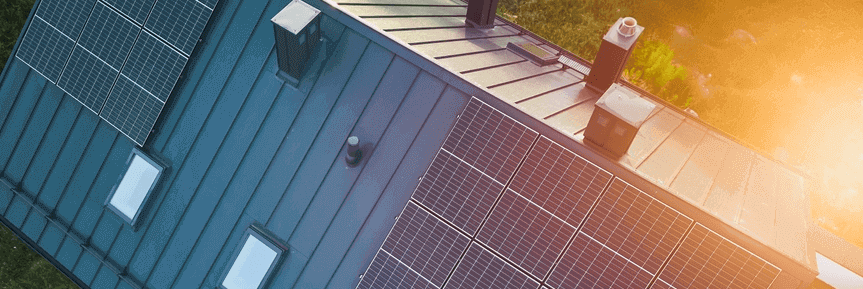KEY POINTS
- A smart meter measures when you use electricity and how much you use. It then sends the information to your energy retailer.
- Solar smart meters also measures the amount of electricity that a household is both receiving from and exporting to the grid.
- A solar smart meter is bi-directional, meaning it can measure both the electricity sourced from the grid and the electricity sent back to the grid from the property.
Installing solar panels is an excellent way to save on electricity costs and reduce your household emissions. But prior to using your new solar system, you may need to upgrade your traditional meter or install a smart meter.
This Canstar Blue article discusses solar smart meters – what they are, where to get them and what they cost.
On this page:
Advertisement
What is a solar smart meter?
A smart meter measures when you use electricity and how much you use. It then sends the information to your energy retailer.
However, a solar smart meter also measures the amount of electricity that a household is both receiving from and exporting to the grid. Unlike traditional electricity meters that can only measure electricity flowing in one direction (typically just from the grid to the property) a solar smart meter is bi-directional, meaning it can measure both the electricity sourced from the grid and the electricity sent back to the grid from the property.
This makes solar smart meters ideal for grid-connected home solar power systems, as it allows the household to send any excess solar power to the grid in exchange for a solar feed-in tariff on their bill.
Do I need a solar smart meter for solar panels?
If you want a grid-connected solar panel system for your home, you’ll likely need to update your traditional meter to a smart meter. If you already have a smart meter, it may just need to be configured so that it can measure the power you export. Once your smart meter is set up for solar, you can start earning credits with a feed-in tariff to help reduce your power bill.
Depending on the solar feed-in tariff you are eligible for, your solar smart meter may be set to either gross or net metering. Gross metering means that all the electricity generated from the solar panels is exported to the grid for a profit. Net metering means customers consume the electricity they need first and only export what’s left over.
Gross metering was a popular set-up during the early solar boom, when some households were eligible for boosted, government-funded feed-in tariffs of 50-60c per kilowatt hour (kWh). These days however, the standard set-up is generally net metering, as solar feed-in tariffs have dropped significantly.
If you are unsure whether your meter will need to be upgraded during your solar installation, or you’d like to learn more about your solar metering options, it may be worth discussing this with your solar installer during the quoting process.
How to read a smart meter with solar panels in Australia
In terms of reading the smart meter itself, different meter types will have different displays. You can scroll through the available data by locating your meter’s scroll button and pressing it to skip from readout to readout.
Some of the data you should be able to read includes:
- How much power your home has imported from the grid
- How much energy you’ve exported to the grid
- The net amount of electricity your home has generated
For specific instructions on how to read your smart solar meter, consult the instructions that came with meter, or Google the make and model.
If you have solar panels and want more details on their performance, consumption patterns, etc. you will need to combine your smart meter with a solar monitoring system. The solar monitoring system is accessed via an app that is connected to the solar system’s inverter and shows an additional layer of your energy use, as well as details on your solar system’s overall performance. The app can also reveal areas where you could be lowering energy consumption, which can help you to save on electricity bills and avoid bill shock.
Compare solar plans and prices
Here are some of the cheapest solar-specific deals from the retailers on our database. These costs are based on the Ausgrid network in Sydney but prices will vary depending on your circumstances. We show one product per retailer, listed in order of lowest price first. Annual price estimates assume general energy usage of 3900kWh/year for a residential customer on a single rate tariff. Price estimates exclude solar feed-in tariff credits. These are products from referral partners†. Our database may not cover all deals in your area, and please check retailer websites for up to date information.
Here are some of the cheapest solar-specific deals from the retailers on our database. These costs are based on the Citipower network in Melbourne but prices will vary depending on your circumstances. We show one product per retailer, listed in order of lowest price first. Annual price estimates assume general energy usage of 4000kWh/year for a residential customer on a single rate tariff. Price estimates exclude solar feed-in tariff credits. These are products from referral partners†. Our database may not cover all deals in your area, and please check retailer websites for up to date information.
Here are some of the cheapest solar-specific deals from the retailers on our database. These costs are based on the Energex network in Brisbane but prices will vary depending on your circumstances. We show one product per retailer, listed in order of lowest price first. Annual price estimates assume general energy usage of 4600kWh/year for a residential customer on a single rate tariff. Price estimates exclude solar feed-in tariff credits. These are products from referral partners†. Our database may not cover all deals in your area, and please check retailer websites for up to date information.
Here are some of the cheapest solar-specific deals from the retailers on our database. These costs are based on SA Power network in Adelaide but prices will vary depending on your circumstances. We show one product per retailer, listed in order of lowest price first. Annual price estimates assume general energy usage of 4000kWh/year for a residential customer on a single rate tariff. Price estimates exclude solar feed-in tariff credits. These are products from referral partners†. Our database may not cover all deals in your area, and please check retailer websites for up to date information.
How do I order a solar meter?
In most cases a new solar meter will be provided by an energy distributor. It can either be installed by your electricity retailer (the company that bills you for power usage) or a qualified electrical professional.
If you require a new smart meter, your solar installer will typically organise this upgrade on your behalf. However, if you are unsure, you can always contact your electricity retailer for more information, as it is usually the one responsible for smart meter installation in most states and territories.
How much do solar meter upgrades cost?
Solar meter costs can range from $150 to $1125, according to SolarQuotes. You can expect to pay an installation fee on top of that, depending on your state or territory, installer and the complexity of the upgrade. Customers who already have a smart meter and only need simple reconfigurations or minor upgrades will pay the least, while those with an old or three-phase meter will generally pay the most as they’ll need a complete reinstallation. Solar meter upgrade costs will all depend on your retailer, so make sure they explain every cost involved in installation prior to committing.
Some electricity retailers can install a smart meter to your property upon request for no upfront cost. However, they may charge you in way of a levy, solar meter charge or just add the costs of the install to your next energy bill. Each retailer is different, as is each state or territory, so it is best to confirm any expected costs and read the fine print before going ahead.
For example, Queensland and Victorian customers with a new Origin solar system will receive a net meter as part of the solar installation process, but this may not always be the case. Be sure to confirm this prior to installing solar panels.
What is a solar meter charge?
Depending on your retailer, some Queensland solar customers will incur a daily solar meter charge. This daily charge is separate to the daily supply charge seen on your electricity bill and helps to recover the cost of installation and maintenance of the new meter. This charge is calculated in accordance with the price cap formula approved by the Australian Energy Regulator and is listed as “Metering Services Charge” on your electricity bill.
If you do pay a solar meter charge as part of your energy plan, you likely won’t be charged an upfront lump sum for the solar meter as the cost for the meter will instead be recuperated through to daily solar meter charge.
How to find a good solar company
Investing in solar power requires research before diving in but the potential savings can make it worthwhile. If you’re having trouble with your solar smart meter installation, reach out to your electricity retailer for personalised advice.
If you want the most from your solar system, it’s important to make sure you’re with a reliable retailer with trusted advice and great customer service. See what other solar customers say about their retailers with Canstar Blue’s solar provider satisfaction ratings below.
Best-Rated Solar Energy Providers
Original reporting by Simon Downes
Image Source: alexgo.photography/Shutterstock




Share this article